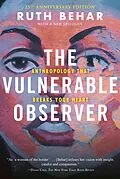The 25th anniversary edition of the book that challenged anthropology's ivory tower, inviting ethnographers to consider vulnerability an asset to-not a failing of-the act of witnessing
In a new epilogue to the 25th edition of The Vulnerable Observer, renowned ethnographer and storyteller Ruth Behar reflects on the groundbreaking impact this "wonderful little book" has had on anthropology, sociology, psychology, and more. The pocket companion for writers, journalists, and activists alike, this book speaks to the power of embodying yourself in your work, not as an act of hubris but as a means for connection.
In a move revolutionary for its time, The Vulnerable Observer proposed a new theory and practice for humanistic anthropology-one that is lived and written in a personal voice. No longer should the ethnographer write at a distance, clad in their "cloak of academic objectivity." Behar calls instead for a fresh approach to ethnography, one which views the self as a vehicle through which readers can travel and relate to each other and the world around them.
Eloquently interweaving ethnography and memoir, Behar proposes a very personal form of anthropology, describing her work as "the most fascinating, bizarre, disturbing, and necessary form of witnessing." She does so in the hope that this work will lead us toward greater depth of understanding and feeling, not only in the field of contemporary anthropology, but in all acts of witnessing.
Autorentext
Ruth Behar-ethnographer, traveler, novelist, poet and filmmaker-is professor of anthropology at the University of Michigan. The recipient of a Fulbright Award, a MacArthur "Genius" Grant, and a John Simon Guggenheim Fellowship, among many others, Behar was also elected to the American Academy of Arts and Sciences. She is the author of several memoirs and novels, including Lucky Broken Girl and An Island Called Home. Born in Havana, Cuba, she grew up in New York, and has also lived in Spain and Mexico. Today she lives in Ann Arbor, Michigan.
Klappentext
The 25th-anniversary edition of the groundbreaking book that changed anthropology, asserting that ethnographers needn't exclude themselves or their vulnerabilities from their work
In a new epilogue to this classic work, renowned ethnographer and storyteller Ruth Behar reflects on the groundbreaking impact The Vulnerable Observer has had on anthropology, sociology, and psychology and on scholarly writing. A pocket companion for writers, journalists, documentarians, and activists alike, this book speaks to the power of including oneself in the story, bringing deeper meaning to the relationship between writer, subject, and reader.
In a move revolutionary for its time, The Vulnerable Observer proposed a new theory and practice for humanistic anthropology. No longer should ethnographers write at a distance, clad in their shroud of "objectivity." In six luminous essays, Behar calls instead for a fresh approach to ethnography, one that is lived and written more openly. Through this very personal account, readers can travel and relate to other peoples and the world around them.
Eloquently interweaving ethnography and memoir, Behar encourages her readers to be open about their experiences, as open as their subjects are with them. She does so in the hope that this work will lead us toward greater depth of understanding and feeling, not only in anthropology but in all efforts to document the shared vulnerability of the observed and the observer.
